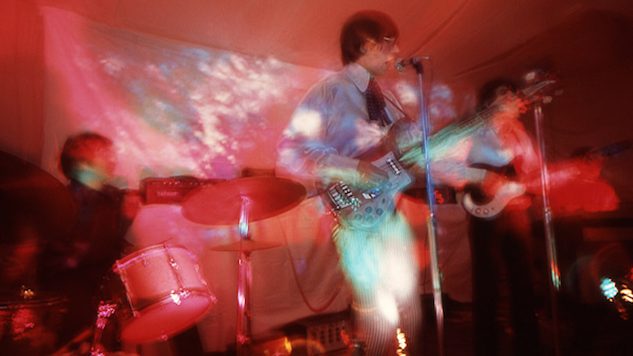Was Syd Barrett an Acid Casualty?
On Psychedelics And the Psyche
Photo by Adam Ritchie/Redferns/Getty Science Features Psychedelics
Syd Barrett is one of the most tragic stories in rock and roll. As the founder and lead singer/guitarist/songwriter for Pink Floyd, he revolutionized rock and roll and spearheaded the burgeoning psychedelic sound of the 1960s. However, shortly after the release of the band’s 1967 debut album The Piper at the Gates of Dawn, something changed. Barrett’s friends and bandmates claim he became more withdrawn, started playing only one chord during concerts, and even becoming catatonic. After Floyd replaced him with David Gilmour, Barrett recorded two solo albums and then left the limelight altogether until his death in 2006. Most people believe his excessive LSD consumption led to Barrett’s demise, but recent studies suggest psychedelics can perhaps improve mental health, not ruin it.
The most recent study comes from Brazil and tested the effects of a hallucinogen called ayahuasca on people with treatment-resistant depression. Fourteen people were given the hallucinogen while 15 people received a placebo. Within one week, more people who took ayahuasca claimed their depression went from severe to mild than those who took the placebo. Of course, as David Mischoulon of Massachusetts General Hospital points out, we need studies that follow patients for longer periods to see whether these effects are sustained.” However other studies that examined the effect of psychedelics on mental health found similar results.
In a study published in 2016, researches from the New York University School of Medicine gave psilocybin to cancer patients along with psychotherapy to see what effect it would have on anxiety and depression. The double-blind study gave some of the 29 participants 0.3 mg of the hallucinogen while others received 250 mg of niacin, then switched after seven weeks. The results found that psilocybin reduced the level of anxiety and depression better than the niacin.
As far as psychedelic drug usage and psychosis, two studies from 2015 found no link between the two. The first comes from Norwegian clinical psychologists Pål-Ørjan Johansen and Teri Suzanne Krebs who shifted through National Survey on Drug Use and Health results from 2001 to 2004. Out of the 130,152 respondents, 13.4 percent said they used psychedelics during their lifetimes. After examining the mental health histories of these respondents and calculating weighted odd ratios, the authors concluded, “We did not find use of psychedelics to be an independent risk factor for mental health problems.” The second study comes from the Journal of Psychopharmacology which also took a look at National Survey on Drug Use and Health results, only this time between 2008 and 2012. The results for a general decrease of suicidal ideation and severe mental distress were significantly less among lifetime psychedelic usage than other hard drugs. “These findings indicate,” the report concludes, “that classic psychedelics may hold promise in the prevention of suicide, supporting the view that classic psychedelics’ most highly restricted legal status should be reconsidered to facilitate scientific study, and suggesting that more extensive clinical research with classic psychedelics is warranted.”
So what happened to Syd Barrett? How did such a promising young talent end up with “a look in [his] eyes like black holes in the sky?” While no one can posthumously diagnose Barrett, the current hypothesis is he already had a genetic predisposition to schizophrenia and the drugs brought it out of him. As former Floyd bassist Roger Waters told the BBC in 2013, “It felt to me at the time that Syd was kind of drifting off the rails, and when you’re drifting off the rails the worst thing you can do is start messing around with hallucinogens … It definitely exacerbated the symptoms that, loosely strung together, you and I might call schizophrenia. He heard voices. He became incommunicative. He turned into a different person; [his eyes] were black holes in the sky.”
The same has been said of another so-called acid casualty in rock and roll, Roky Erickson from the 13th Floor Elevators who, according to the documentary You’re Gonna Miss Me, starting speaking gibberish during the height of the band’s popularity. There’s also Daniel Johnston who always struggled with bipolar disorder, but soon became obsessed with the end times after taking acid during a Butthole Surfers show.
Like with most drugs, it is safe to assume that when it comes to psychedelics, results may vary. This is why Richard Friedman recently wrote an op-ed for the New York Times reminding readers that “we don’t know how safe or effective psychedelics are because most of the data have been anecdotal or from small trials.” However, at this point the evidence suggests that psychedelics can help people with depression and anxiety, but not psychosis, so if you have a family history of schizophrenia, better lay off the acid for now.
Trav Mamone is a queer trans blogger who write about the intersections of social justice and secular humanism at Bi Any Means. They also host the Bi Any Means Podcast and co-host the Biskeptical Podcast.